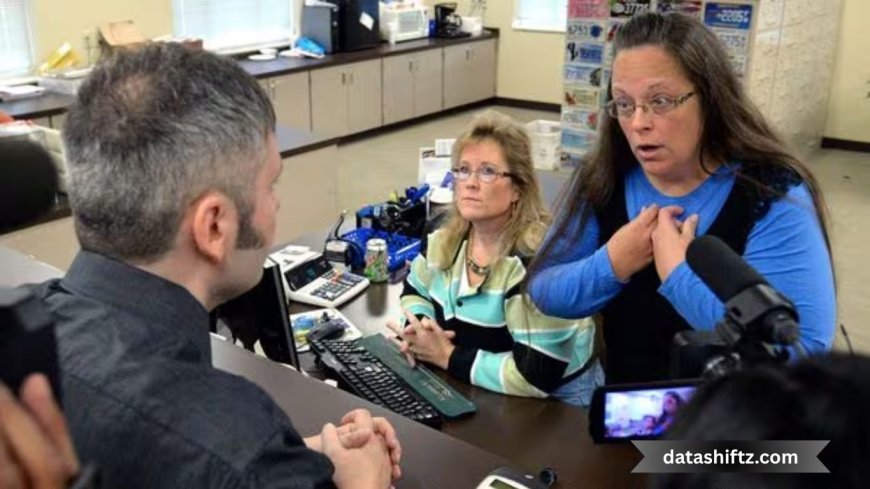Kim Davis Takes Her Fight Back to the Supreme Court: Latest Updates

The ongoing legal battle of former Kentucky clerk Kim Davis has resurfaced as she once again petitions the U.S. Supreme Court—this time explicitly targeting the landmark Obergefell v. Hodges decision. Her appeal, widely covered today, reignites a national debate over religious liberty, precedent, and the future of marriage equality in America.
The Current Legal Scenario
Background and Context
Kim Davis, the former Rowan County clerk in Kentucky, drew international attention in 2015 when she refused to issue marriage licenses to same‑sex couples—citing religious objections—even after the Supreme Court legalized same‑sex marriage in Obergefell v. Hodges. Her actions led to contempt of court charges and a brief jail sentence. Ultimately, a federal jury awarded over $360,000 in damages and legal fees against her.
Today’s Developments
-
Supreme Court Petition: In July 2025, Davis—through Liberty Counsel—filed a writ of certiorari asking SCOTUS to revisit and overturn both the Obergefell decision and a 2022 ruling that found she violated constitutional rights by denying marriage licenses.
-
Liberty Counsel deems Obergefell a “legal fiction” that infringes religious liberty; they urge the Court to protect First Amendment rights for officials acting out of faith.
-
Observers believe, as in 2020, the Supreme Court is expected to decline her petition. William Powell, attorney for one of the plaintiffs, emphasized that marriage equality remains settled law.
-
Larger Conservative Strategy: Davis’s case is part of a broader right‑wing campaign in 2025 to dismantle LGBTQ+ rights via court challenges and new legislation like “covenant marriages”—though such bills have largely stalled in state legislatures.
Why It Matters
The implications of Davis’s appeal extend far beyond her own legal entanglements:
-
Religious Liberty vs. Legal Duty: At stake is whether government officials can claim religious objection to justify non‑compliance with constitutional mandates.
-
Threat to Precedent: Establishing that Obergefell can be overturned may open the door to attacks on other privacy and equality rights grounded in substantive due process.
-
Institutional Stability: Reconsidering Obergefell risks unraveling decades of legal clarity around marriage rights, with widespread social and legal ramifications.
Snapshot Overview: Today’s Key Facts
| Aspect | Details |
|---|---|
| Who | Kim Davis, former Rowan County, Kentucky clerk |
| What | Filed Supreme Court petition to overturn Obergefell + 2022 liability ruling |
| Why | Cites First Amendment (religious freedom, free speech) |
| Result | Lower courts upheld liability; SCOTUS likely to decline |
| Broader Context | Part of broader 2025 conservative push against same‑sex marriage rights |
Key Points
-
Historical Controversy: Davis refused to issue same‑sex marriage licenses in 2015, defying federal court orders and briefly serving jail time.
-
Legal Judgment: A jury ordered her to pay $100,000 in damages plus attorney fees—totaling over $360,000.
-
-
Question of First Amendment protections in an individual‑capacity lawsuit against Davis.
-
Seeking to reverse Obergefell as a “legal fiction” under substantive due process.
-
-
Supreme Court’s Likely Response: Historical precedent suggests courts may decline—or use procedural grounds to avoid revisiting Obergefell.
-
National Movement: Davis’s actions are part of broader 2025 efforts by conservatives to redefine marriage through legislation and court challenges.
Conclusion
While Kim Davis’s latest bid may be doomed by precedent and public sentiment, it serves as a flashpoint for constitutional debates about religious liberty, judicial stability, and the last decade’s gains for LGBTQ+ equality. Whether the Supreme Court takes it up or not, the underlying watershed issues—Substantive Due Process, First Amendment boundaries, and the resilience of decisions rooted in equality—remain very much alive.
Watching this case offers a glimpse into how legal strategies may evolve in the post‑Dobbs era, and how courts might interpret religious accommodation in government roles. Should the battle continue, its reverberations will be felt across legal, cultural, and political arenas for years to come.






























